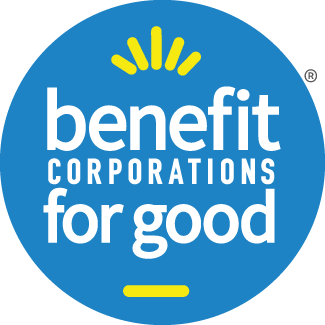How a Portland Creative Services Firm Found Its Big Idea in Legalese
Never underestimate the power of an idea whose time has come. And that time was just three weeks for creative wizard Julie Eickhof of Eickhof Creative Shop. You see, while changing her business structure to an LLC, her legal advisor Michael Jonas of Rational Unicorn Legal Services suggested she consider also becoming an Oregon Benefit Company.
Now this is something the attorney knew a little bit about since he’d gone through the same process three months earlier. He told Julie that she and her values-driven creative shop already modeled the principles of the Triple Bottom Line of People, Planet and Profit. So why not codify her existing commitment and practice for all her stakeholders to see.
And so it was as she certified those values and practices through Benefit Corporations for Good.
We interviewed Julie Eickhof recently about becoming a certified Oregon Benefit Company. Here’s what she had to say about her motivation for doing it and what it’s done for her business.
1. What motivated you to become a Benefit Company?
We've always taken a progressive, principled approach to operations and client services, including giving back to the community through ongoing pro bono work and rejecting the notion that profitability requires the exploitation of people and resources. We've also been watching the groundswell of the B Corp movement for years and recently learned that Oregon has set an important precedent by allowing LLCs to earn Benefit Company status. Given our company ethic, we immediately jumped at the opportunity to formally demonstrate our commitment to a better way of doing business.
2. Was it difficult getting internal support for moving toward this model?
Not at all! Our Director of Human Resources, Jake, loved the idea of officially changing our business model to the Three Ps of People, Planet and Profit. As a rescue dog, he's already made it his personal mission to promote self-care and wellness within our company; it's only natural that he would want to extend that same consideration and kindness to our community and environment.
3. How long did it take you to officially become a Benefit Company?
Just two weeks! We learned that we were a viable candidate while working on our LLC formation with Rational Unicorn Legal Services LLC, another certified Benefit Company. The application process was satisfyingly rigorous, and we were beyond impressed when Tom and Mary Anne took the time to discuss our strengths and identify areas for improvement. Since we don't see our certification as the destination but rather the roadmap, their feedback has been invaluable to our company's evolution.
4. Have you seen any change in culture since you became a Benefit Company?
Our culture is still as passionately progressive as ever, but there's been an obvious shift in the way we make decisions, evaluate prospective clients, and plan for the future. Doing good in the world is great, but doing it with greater consciousness, purpose, and deliberation is even better. We've also become more vocal about encouraging our clients and fellow businesses to implement and promote Benefit Company values.
5. Have you experienced any positive outcomes since becoming a Benefit Company?
Definitely, even in the very short time that we've had our certification. We've found awesome new opportunities to collaborate with other Benefit Companies and grow our referral network. We're also hearing that our Benefit Company status resonates deeply with new and existing clients, who enthusiastically support our certified commitment to honesty, transparency, and empathy.
6. Would you recommend this business model to others? Why or why not?
Heartily! Everything about the People-Planet-Profit model sits squarely on the right side of history, and we sincerely hope that, within our lifetime, it becomes inconceivable to do business any other way.
7. What is the most important trait to have as a conscientious leader of a Benefit Company?
Being outcome-oriented, not ego-driven. Effective leaders and their teams stay focused on "why" and "how," not "who." They encourage collaboration, innovation, and respect – and strive for collective success.
8. What lessons have you learned in the process?
During the certification process, we learned that it's okay to not be perfect in all areas, as long as our hearts are in the right place and our actions keep us moving in the right direction. We learned that remembering why we started the business in the first place can be a powerful source of joy, meaning, and motivation. And we learned to truly appreciate that having Benefit Company values isn't just a part of what we do – it's who we are.
9. Is being a Benefit Company part of your current brand message?
Absolutely! To bring us into better alignment with our Benefit Company values, we're currently refining our brand messaging, reconfiguring our service offerings, and rolling out some cool new features.
10. What is the single best reason you'd give for another company or peer to become a Benefit Company?
You can sleep at night with a clean conscience. Is there any greater legacy than to leave the world a little nicer than we found it?
You can learn more about Eickhof Creative Shop here.
If you want to know more about why your business should become a benefit corporation, watch this.
—>Learn more about the 6 simple steps to becoming a certified Oregon Benefit Company or benefit corporation.
~benefitcorporationsforgood.com~

